
I will observe the 2006 Venezuelan presidential elections with the Bolivarian Circle of Boston.
Thursday, December 07, 2006
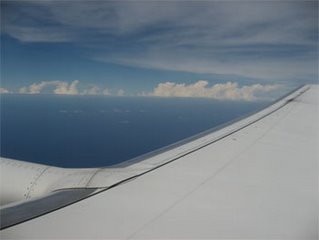
Leaving Caracas
On Wednesday afternoon we returned to Caracas and then flew back to the States on Thursday morning. What really struck me both being on the bus back in Caracas and in Caracas is just how over the contentious and bitterly contested elections were. On the eve of the elections in Barquisimeto, we were warned of an opposition “Plan V” (for Victory but perhaps also for Violence) to create civil unrest after their inevitable defeat. But there was no sign of such a plan being implemented. The opposition seemed to be quietly accepting their defeat. There were not the internal recriminations pointing to a collapsing opposition, or a lashing out at allegedly fraudulent electoral procedures, as happened after the failed 2004 referendum on the Chavez presidency. Are the escualidos coming to terms with their growing irrelevance as the Bolivarian Revolution consolidates a socialist project?
Those of us remaining in Caracas went out for one last dinner. I ordered a spaghetti pesto, but it came much more quickly than it should have were it prepared freshly. I woke up in the middle of the nite with severe stomach cramps. My head was already pounding, probably from pressure on my sinuses from the moist warm ocean air along with the fumes from a oil refinery in Puerto Cabello where we had stayed the last two evenings at an executive club in the PDVSA plant. Barfing my guts out, I get on American Airlines. Fortunately, I have a sympathetic flight attendant named Alyce who brings me a club soda, and my stomach begins to calm down. </Marc> <!--11:19 PM-->
Tuesday, December 05, 2006
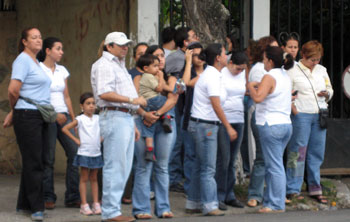 Counting the votes
Counting the votesPolls were to close at 4 p.m. on Sunday, but were to stay open as long as there was a line of voters. We arrived at the polling station at Liceo Mario Briceño Igagorry in Barquisimeto to observe the count, and at 4 p.m. only the sixth “mesa” (of six) still had a line. The number of voters was evenly distributed among the mesas (about 520 each), but in the sixth mesa officials only let in one voter at a time while in the others a constant stream flowed through the room.
Officials declared that 10 observers for each mesa could come in to watch the vote count, which caused a bit of jockeying outside the polling station as activists tried to determine who would get in. Voters were not allowed to wear political propaganda or party colors (red for Chavez; blue for Rosales), but opposition members had agreed to wear white in order to be able to identify each other. This was a conservative neighborhood, and there was a sea of white outside the station. When a car waving Chavista flags drove by, they would scream about how they were violating election law. When an opposition member went by and waved a symbol of their campaign, they would cheer wildly. Consistency is not a virtue among esqualidos.
It was after dark when table six finally closed and the police and soldiers guarding the voting station began to let people in to vote. Our observer group was allowed to place one observer at each mesa. When one of our members, Susan, entered table four the already assembled witnesses cheered wildly. I was placed in table three. Opposition members whispered that polls showed Rosales taking the elections by 80 percent (Chavistas reported that they were winning the election by as much as 70 percent). From the opposition perspective, our presence would legitimize their victory.
After much waiting, a technician came to the room, entered the code for the machine, and printed out the voting results. About 380 people voted at each mesa, for about a 75 percent participation rate. Voting results were by party not candidate, so it was not immediately obvious who had won. One of the officials began to read off the tallies so that witnesses could make a vote count. About 160 had voted for Chavez, and about 220 for Rosales with 3 votes for one of the other minor candidates and one null vote. When the wide margin of victory (60 to 40 percent, about the reverse of the national outcome) became apparent, white-shirted officials let out a sigh of relief while those who were witnesses cheered. The few Chavistas largely remained quiet. The streets became increasingly noisy with firecrackers and both Rosales and Chavez supporters parading in front of the polling station.
The technician at my mesa than loudly proclaimed to those assembled that he was connecting the voting machine to the central collection point, transmitting the data, and printing out confirmation that the data was sent. Convinced that they had won, most of the witnesses left. The election officials began the long process of wrapping up the paperwork, signing forms, packaging up the equipment and boxes, etc. The technician printed out 10 copies of the vote report, and each official signed each copy for each representative at the mesa. A copy was also delivered to the election observers. The technician printed out a separate report showing each vote cast. Multiple redundancies were built in throughout the entire process.
Once everything had been packed up (with table six taking much longer than the others), the president of each mesa gathered to select three tables for the paper audit. David, part of our observer team, was selected as an impartial person to select the three mesas. Six pieces of paper with the numbers one through six were put in a plastic bag and he pulled out two, four, and five. Everyone sighed that he had not pulled number six, though some had previously debated requiring the sixth table to do the manual count. Seemingly without complaint, the three selected mesas went back to work, pulling out the instruction manuals and opening up the material that they had just packaged. I observed table two as the president of the mesa pulled out each ballot and counted them one by one to 385–the same number of people who had voted at that mesa. Everyone sighed that there would be no discrepancy to resolve. The president then began to count the votes for each candidate (after conferring with the instruction manual, they determined that the vote would be by candidate not party, making the process somewhat simpler).
Monday, December 04, 2006
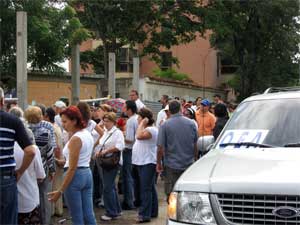 Sunday, December 3
Sunday, December 3We started the morning by observing the elections in the Escuela Nacional Bolivariana Baridida in Barquisimeto. There were six "mesas" (voting booths) in the voting center, and a long line stretched several blocks down the street from the front entrance to the school. Elderly people were allowed to go to the front of the line. Today was overcast with a cool breeze, making waiting in line not as much of a burden as it otherwise might be.
Five people worked each voting booth. When a voter enters the room, one of the election officials checks the identification against the registry of voters, has that person sign and place a thumb print beside the name, and then stamps "vote" beside the name. The voter then proceeds to the next table where the president of the "mesa" asks if the voter knows how to vote, and if not gives instructions. The president presses a button which unlocks the voting machine, and the voter proceeds alone to the machine. On a tablet the voter selects a candidate and party, and that image appears on the voting machine. The voter presses a button to confirm the selection, and the machine prints out a receipt with the candidate's name and party. The voter than deposits that receipt in a box for a paper trail audit. The final step is to have the voter dip the pinky finger in indelible ink so as to prevent voting again.
Two witnesses were in each of the mesas we observed, one for each of the two main candidates. One of the witnesses had a printout of the list of voters for that mesa, and checked off each name as they came in the room. The second witness simply observed the process. Other than minor technical problems, the witnesses said that the voting was going smoothly. Most of the problems were a result of voter error or confusion, despite recent elections utilizing the exact same equipment and an intensive voter education campaign.
The most common voter error was pressing "vote" without verifying that the candidate's name and image had appeared on the machine. This causes the receipt to print out blank. Once the vote has been cast as such, a re-vote becomes impossible. A technician explained that the system is set up to allow a null vote, but that multiple checks are designed to prevent such an unintentional occurrence. If a voter has not selected a candidate, the machine will as ask if indeed does that person not want to vote for any candidate.
11:45 a.m.: random firecrackers are exploding around the neighborhood, setting off car alarms. We've been told that this is an opposition tactic to help spread unease among the population.
In one case we observed the receipt printed out blank despite the voter claiming that she had selected a candidate properly. The mesa temporarily shut down as the officials debated how to proceed. Two different technicians (of the three working the center) were brought in to check out the machine. It appeared that there was not a problem with the machine, and they declared that if indeed the voter had properly pressed the correct buttons that the vote would be registered as such. Karen, the coordinator for the entire voting center, made an announcement to the entire mesa that they would fill out a declaration ("acta") reporting on the error. Initially, the coordinator said that for privacy's sake the name of the candidate would not appear on the declaration, but when the voter insisted she conceded to allow that notation.
After this apparent glitch, the president asked for silence in the room to monitor carefully the next several votes. She carefully guided the voters through the process, and waited to hear a "beep" when each button was pressed. With silence in the room, the beeps were clearly audible and verified each step of the process. Throughout this entire process, each official was careful to stand back from the voting machine so as not to compromise the integrity of the vote. The only two exceptions were the technician who checked out the machine, and elderly voters who brought along an assistant to help cast the vote (for example, a grandson helping his grandfather vote).
The polls were to open at 6 a.m., but some initial glitches delayed that opening at this voting center. The polls are to close at 4 p.m., but will remain open as long as people are in line. One technician said that it would probably be midnite before everything was wrapped up and he could go home.
For an election with two main presidential candidates (the incumbent Hugo Chavez and challenger Manuel Rosas) for only one single race (there where no other issues or races), the ballet appears to be unusually complicated. By my count, Chavez appeared with 24 different party affiliations, and Rosales with 41, with about 20 other minor candidates (both men and women). There were 86 possible choices (so I'm missing one somewhere, but you get the point).
In sum, the voting process we observed was slow and carefully monitored which resulted in long lines, but otherwise appears to be proceeding in an orderly and transparent function. </Marc> <!--9:35 AM-->
Saturday, December 02, 2006
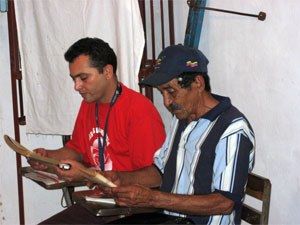
Last nite we went to visit an adult education program in the community of Lomas de Tabure. A variety of Missions (Robinson, Ribas, etc.) provides literacy and skills training. It was an intereting and empowering experience to listen to teachers and students discuss the positive gains and impacts that the Bolivarian Revolution has made on their lives. </Marc> <!--10:22 AM-->
Friday, December 01, 2006
In an internet cafe in Barquisimeto that is not cooperating with me. This morning we visited a Barrio Adentro clinic and a couple largely women-run cooperatives. They talked about how the Chavez government facilites access to loans at favorable rates and other such support that allows coops to flurish now in Venezuela. Here is a picture of us; I´ll try to write more later. </Marc> <!--6:28 PM-->
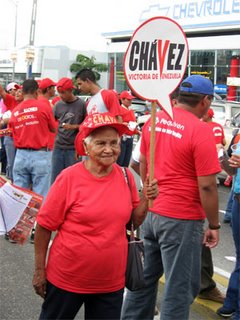
We started Thursday morning with breakfast with Greg Wilpert, editor of Venezuelanalysis.com. He provided us with an overview of factors that led to Hugo Chavez's rise to power in Venezuela. Polls put Chavez's support at about 60 percent in Sunday's presidential election, with the main opposition candidate trailed significantly at about 30 percent. Chavez speaks of a twenty-first century socialism for Venezuela, but it is still not entirely clear what that transition may look like or what all might be involved in this socialist model. There are significant changes underway, though, including a dramatic growth in the cooperative sector. Problems that the country faces include attempting to break out of a culture of patronage, clientalism, and corruption. Wilpert described Chavez as a latent personality cult, and the struggle to build a broader popular movement that would survive beyond the actions of one person.
We then got on our bus to leave Caracas for Barquisimeto where we will observe Sunday's election. Along the way, we made a stop in Maracay to observe the closure of Chavez's campaign in that town. As with all of his campaign stops, there was a sea of red with energetic shouts that Chavez is here to stay. After nightfall, we arrived in Barquisimeto at our Hotel Circulo Militar. </Marc> <!--4:52 PM-->
Wednesday, November 29, 2006
Arrived in Caracas last nite w/o a problem. Or, actually, the problem did not have to do with flying but a server crash at NativeWeb that had me working overtime from the Dallas airport to try to get stuff back up and running (it's not).
Today we went to visit the Missions in Caracas. These are interesting government-funded programs that deal with a variety of social issues--education, health, food, etc. The programs show rather vividly what many poorer people value so much about Chavez's Bolivarian Revolution.
We visted the Cooperative Nude Fabrico Ojeda. Some have criticized the Bolivarian Revolution for being too much of a state-centered project, but one thing that shows potential for this project is the creation of spaces for new projects like this coop. In a way, it is projects like this that will reveal whether or not the social changes we are witnessing here are a success.
We also visited Barrio Adentro, the project that has brought Cuban doctors to provide first-line preventative community-based medical care. New missions are also in the process of being set up. We visited on eof the most recent--Mision Madres del Barrio that works with mothers in local neighborhoods.
Tomorrow we had out to Lara state. Caracas is too big of a city for me, and I look forward to getting out of it. I'm tired and my head hurts. And NativeWeb is still not back together--and may not be for several days. </Marc> <!--6:06 PM-->